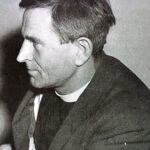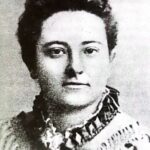TOGBI SRI
Togbi Sri II (1862-1956) was the Awoamefia (paramount chief) of Anlo for nearly 50 years (1907-1956). He distinguished himself as an innovator and as a statesman, and was an advocate of Ewe unity.
Cornelius Kofi Kwakume, as he was known before his enstoolment, was born in 1862, and was educated at Breman Mission School at Keta, in what is now the extreme southeast of Ghana. He worked as a tailor, storekeeper, and watch repairer, and was later employed as a customs officer, trader, and company director in Keta, as well as in the German colonies of Togo and Kamerun (now Cameroon). In Kamerun, he became the head of the Ewe community.
In July 1907, he was enstooled as Sri II, Awoamefia of Anlo. The enactment of the native Jurisdiction Amendment Ordinance of 1910, and the recommendations of the Crowther Commission of 1912, resulted in his authority being recognised as extending not only over Anlo proper, but also over a number of adjacent towns and villages, including Some, Aflao, Klikor, Dzodze, Whenyi, Afife, Wheta, Avenor, Kheve and Mafi.
His education, travels, experience, tact and ability were an asset in his new office. He endeavoured to promote material progress in his state, and fought against traditional practices and taboos that militate against this. Mindful of the importance of road communication in promoting development, he organised the construction by voluntary labour of a road from Atiteti, on the east bank of the Volta River at its mouth, along the coast to Keta, and on to Aflao, further east, thereby linking the western and eastern extremities of his paramountcy. He broke the tradition requiring the Awoamefia to live in perpetual seclusion, as well as the taboo which forbade the Awoamefia to wear European dress, and forbade strangers to visit his capital, Anloga. He dramatises his modernism by riding a bicycle through the streets of Anloga, and to and from Keta. He sustained the fight against the traditional practice of intramural burial by setting aside land for public cemeteries. He also took advantage of the fire of 1911 to rebuild the town of Anloga more hygienically and with a modern lay-out. As a Christian, he promoted the efforts of the Breman Mission in Anlo.
He was an early advocate of Ewe unification. He supported the British forces against German Togo upon the outbreak of the First World War in 1914, taking this action with a view to reunifying the Ewe, who were separated by the frontier between Togo and the Gold Coast. He was awarded the King’s Medal for African Chiefs (K.M.A.C) for his efforts, but was disappointed in his hopes for Ewe unification when the Ewe remained divided by the partition of Togo into British and French spheres.
His activities extended beyond greater Anlo. In 1916, he was nominated to represent the Ewe on the Legislative Council of the Gold Coast, and was to continue to serve on it for 22 years. He also sat on the Eastern Provincial Council from 1926 onwards. He participated actively in the work of both councils, and effectively championed the cause of his people. His participation, and the issues that attracted him, make it clear that he was one of the most forward-looking chiefs of his time. In later years he came to identify himself with the struggle for independence. Thanks to his fair-mindedness and objectivity, he retained the confidence of his people, and also esteem of the various government representatives he had to deal with.
In addition to the K.M.A.C., he was awarded the Order of the British Empire (O. B. E.) and was made a Commander of the British Empire (C. B. E.). He died in 1956.
E. K. AMENUMEY


